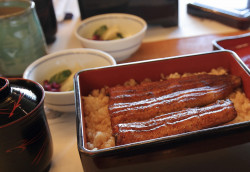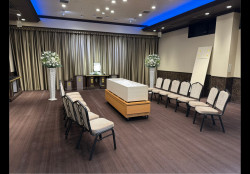
November 25, 2010
Maywa Denki
Nobumichi Tosa’s whimsical creations sound the battle squeak against digital music
Originally published on metropolis.co.jp on November 2010

Photo by Dan Grunebaum
When budding media artist Nobumichi Tosa told his dad that he wanted to name his new project after the family’s failed electronics firm, the old man was duly shocked. “The original Maywa Denki went bankrupt, so my dad’s first reaction was, ‘You might become liable for the debt!’” Tosa recalls at his small workshop in Shinagawa Ward. “He didn’t understand it was a joke.”
Formed in 1993 by Nobumichi and his brother Masamichi (who left the group in 2001), Maywa Denki cuts across worlds with whimsical objects that blur the line between artwork, manufactured toy and musical instrument. Their Otamatone is a smiley-faced, note-shaped gizmo that sounds something like a theremin when you rub your finger along its neck. Launched last year, it’s shifted over 100,000 units and now has its own iPhone application, while Tosa has just cut a deal to sell it in hundreds of malls across the US.
You can appreciate this and other Maywa Denki creations like the Charigaki—a musical instrument made from a bicycle—for their sheer visceral gimmick value. But the group’s exhibitions at major museums, and the regular invitations they get to highbrow media art festivals, indicate that there’s also some deep thinking behind their work.
“I listened to a huge amount of music growing up, but as I got older I began to get bored by it all,” Tosa says. “Then when MP3 players came along, with their poor sound quality, I stopped wanting to listen to music. I started out in a brass band. The clang and clash of brass instruments is still in my blood. With MP3s, what you’re hearing is a lot of processed information, which I find somehow tiring.”
It’s not that Maywa Denki’s orchestra of mechanical Neverland instruments is entirely computer-free, or that Tosa is opposed to digital music—in fact, he composes by translating his own vocal melodies into computer MIDI signals that power his devices. Rather, it’s that he feels that music has lost its sense of mystery.
“Ancient instruments often had a face or god depicted on them, and it’s this sacred quality to music that fascinates me,” he says. “They were an aspect of faith. With the mass production of musical instruments, that magical quality got watered down. Somehow I want Maywa Denki’s instruments to have that magic.”
The cost of staging a Maywa Denki concert means that they only happen occasionally, but audiences from Japan to Europe and North America are invariably charmed by the sight of instruments like the Otamatone or the giant, flower-shaped Marinka xylophone banging and clanging away. It’s almost as if the Tin Man from The Wizard of Oz had formed a band.
“There will be no regular instruments,” Tosa says about Maywa Denki’s upcoming Christmas concert, in which he’ll direct his employees and assistants in operating a battery of musical devices. “There will be two types: automatic and manually operated ones. The instruments sometimes break, which becomes part of the show. It’s kind of like F1 racing. We try hard to keep them from breaking, but with more than 30 instruments, some kind of trouble always arises.”
Overseas, Maywa Denki seems to represent another facet of Japanese Cool. “Our style represents Japan—with the work suits and neckties, it’s difficult to tell if we are white or blue collar—but at the same time, we have these eccentric toys that embody quirky J-culture. We’re otaku, but based not in anime or manga, but art.”
In Japan, the reaction is more prosaic. “We elicit a bemused sense of nostalgia for Japan’s postwar high-growth period,” explains Tosa. “We also get a lot of women. Probably it’s because the machines are cute, and because Japanese women are more culturally inclined than men.”
Maywa Denki
Splendidly batty homemade instrument ensemble. Dec 19, 7:30pm, ¥3,500 (adv)/¥4,000 (door). Yoshimoto Prince Theater, Shinagawa. Tel: 03-5447-2226.







